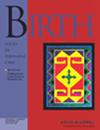Feasibility of a Community-Developed Survey Measuring Experiences of Pregnancy Care for LGBTQ2S+ Families
Abstract
Introduction
Despite increased recognition of and support for family building among lesbian, gay, bisexual, transgender, queer, Two-Spirit, and other sexual and gender minoritized (LGBTQ2S+) populations, there is still little evidence describing the experiences of pregnancy care within these populations in quantifiable ways. This paper describes our pilot study process and the feasibility of implementing a community-developed survey measuring respectful pregnancy care within LGBTQ2S+ communities.
Methods
Using a participatory action research approach, a Community Steering Council developed and piloted the Birth Includes Us survey. To assess the feasibility of the survey, recruitment was assessed through how participants heard about the study, and enrollment and survey completion were tracked in the REDCap survey platform. We used descriptive statistics to report the demographics of the pilot sample.
Results
Recruitment through social media, predominantly Facebook, was an effective route to reach the target population, accounting for over 60% of the sample. Of the 404 eligible participants who opened the survey, 91% completed the survey. The pilot study sample represented 41/50 states in the USA and 5/13 provinces and territories across Canada. While only 17% of the sample were members of racially minoritized communities, there was wide representation across genders and sexualities.
Conclusion
The findings of this feasibility pilot study will inform the implementation of the Birth Includes Us survey to ensure the recruitment, enrollment, and retention of diverse participants. Lessons learned from this process will also support researchers in developing mitigating strategies to minimize the harm incurred during the process of LGBTQ2S+ family building.

 求助内容:
求助内容: 应助结果提醒方式:
应助结果提醒方式:


